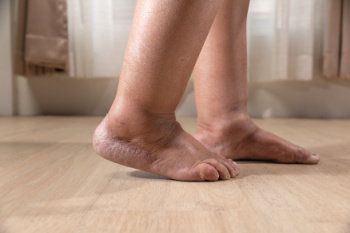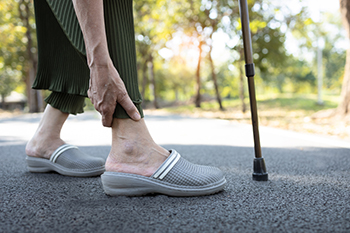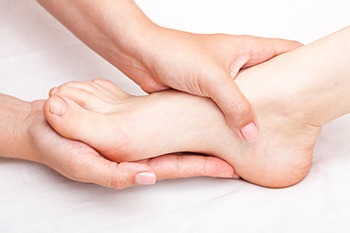Blog
Items filtered by date: April 2025
Recovery From a Broken Foot

A broken foot, also called a foot fracture, occurs when one or more of the 26 bones in the foot break from trauma or overuse. These foot fractures can result from falls, accidents, or repetitive stress from running or jumping. Symptoms of a broken foot include pain, swelling, bruising, difficulty walking, and reduced movement in the toes, foot, or ankle. A podiatrist will typically use an X-ray to confirm the diagnosis and identify the specific bone involved. Fractures in the long bones of the foot, called metatarsals, are common and may require a cast or stiff walking boot to keep the foot stable while it is healing. In more serious cases, such as when bones shift out of place, surgery may be needed to realign them. This involves using metal screws or plates to hold the bones together as they heal. A podiatrist will closely monitor your recovery and help you return to normal movement while reducing the risk of long-term issues like arthritis or permanent stiffness. If you have broken your foot, it is suggested that you make an immediate appointment with a podiatrist for treatment.
A broken foot requires immediate medical attention and treatment. If you need your feet checked, contact Huydran Vaughn, DPM from Vaughn Podiatry Center. Our doctor can provide the care you need to keep you pain-free and on your feet.
Broken Foot Causes, Symptoms, and Treatment
A broken foot is caused by one of the bones in the foot typically breaking when bended, crushed, or stretched beyond its natural capabilities. Usually the location of the fracture indicates how the break occurred, whether it was through an object, fall, or any other type of injury.
Common Symptoms of Broken Feet:
- Bruising
- Pain
- Redness
- Swelling
- Blue in color
- Numbness
- Cold
- Misshapen
- Cuts
- Deformities
Those that suspect they have a broken foot shoot seek urgent medical attention where a medical professional could diagnose the severity.
Treatment for broken bones varies depending on the cause, severity and location. Some will require the use of splints, casts or crutches while others could even involve surgery to repair the broken bones. Personal care includes the use of ice and keeping the foot stabilized and elevated.
If you have any questions please feel free to contact our office located in Montgomery, AL . We offer the newest diagnostic and treatment technologies for all your foot and ankle needs.
Swollen Feet or Ankles May Signal Other Problems

Swollen ankles are often caused by a buildup of fluid in the soft tissues, known as edema. This can develop for many reasons, including standing or sitting in one position for too long, consuming high amounts of salt, being overweight, pregnancy, or taking certain medications. Swollen ankles may also result from an ankle sprain, infection, insect bite, or more serious conditions involving the heart, kidneys, or liver. Symptoms can include puffiness around the ankles and feet, shiny or stretched skin, skin discoloration, and discomfort or stiffness. In some cases, pressing the skin may leave a dent. A podiatrist can perform a detailed exam to determine whether the swelling is linked to an injury, circulation problem, or another medical condition. Depending on the cause, treatment may involve reducing inflammation, draining excess fluid, prescribing medication, or correcting biomechanical issues with the foot or ankle. In severe or persistent cases, surgery may be recommended to resolve structural or vascular concerns. If you have swollen ankles, it is suggested that you schedule an appointment with a podiatrist for an exam, diagnosis, and appropriate treatment.
Swollen feet can be a sign of an underlying condition. If you have any concerns, contact Huydran Vaughn, DPM of Vaughn Podiatry Center. Our doctor can provide the care you need to keep you pain-free and on your feet.
Swollen feet are a common ailment among pregnant women and people who stand or sit for extended periods. Aging may increase the possibility of swollen feet and patients who are obese often notice when their feet are swelling too. There may be medical reasons why swollen feet occur:
- Phlebitis - A condition that causes the veins to become inflamed and can also cause leg pain.
- Liver disease - This may lead to low blood levels of albumin which is a protein. This can cause fluid in the blood to pass into the tissues and several areas of the body can become swollen.
- Heart failure - When the heart doesn’t pump properly the blood that is normally pumped back to the heart can pool in the veins of the legs causing swollen feet.
- Kidney disease - One of the main functions of the kidneys is releasing excess fluid in the body. This type of condition can make it difficult for the kidneys to function properly, and as a result the feet may become swollen.
- Deep-vein thrombosis (DVT)- This is a serious condition where blood clots form in the veins of the legs. They can block the return of blood from the legs to the heart which may cause the feet to swell. It is important to be treated by a podiatrist if this condition is present.
Swollen feet can also be caused by bone and tendon conditions, including fractures, arthritis, and tendinitis. Additionally, there may be skin and toenail conditions and an infection may cause the feet to swell. Patients who take medicine to treat high blood pressure may be prone to getting swollen feet.
Many patients elevate their feet to help relieve the swelling and this is generally a temporary remedy. When a podiatrist is consulted the reason behind the swelling can be uncovered and subsequently treated.
If you have any questions please feel free to contact our office located in Montgomery, AL . We offer the newest diagnostic tools and technology to treat your foot and ankle needs.
Foot Health For Seniors

Elderly foot care is essential, as aging can lead to various foot conditions like arthritis, stress fractures, and fallen arches. Arthritis in the feet causes joint pain, swelling, and stiffness, often making walking difficult. Stress fractures, which are small cracks in the bones, can result from weakened bones and repetitive stress, causing pain, swelling, and difficulty bearing weight. Fallen arches, or flat feet, occur when the arches of the feet collapse, leading to pain and discomfort in the feet, knees, or lower back. These conditions can result from the natural aging process, loss of bone density, or prior injuries. The pain and discomfort can significantly affect mobility and quality of life. A podiatrist can help by providing treatments such as custom orthotics, pain management, targeted exercises, or, in some cases, surgery. They can also recommend footwear modifications to alleviate pressure and improve comfort. If you are dealing with foot pain, it is suggested that you make an appointment with a podiatrist.
If you need your feet checked, contact Huydran Vaughn, DPM of Vaughn Podiatry Center. Our doctor will attend to all of your foot and ankle needs and provide you with quality treatment.
Geriatrics and Podiatry
When people age, some common issues that may occur are bone density loss, dry skin, poor circulation, and rough brittle nails. These issues may also affect your foot health if the necessary steps are not taken to alleviate the problems.
It is important to take care of your feet because feet that are injured or diseased can affect your overall health. Having painful feet hinders your ability to do daily activities or may decrease your willingness to do the things that you need to do.
Visiting Your Geriatrician
As we age, health problems become more likely, so it is essential to visit your doctor for check-ups to ensure that you are doing the best you can to take care of your health. It is recommended to check your feet frequently for any possible cuts, bruises, swelling, corns or any other irregularities.
Taking Care of Elderly Feet
Cracked or dry feet can be treated by applying moisturizer often. It is also important not to wear old socks because the older the sock is, the higher the possibility there will be that there is bacteria there. Wear fresh socks and make sure they fit properly.
Proper foot health means that you can have a more active lifestyle and you will not be bogged down by pain. Foot health also leads to good circulation, which is paramount for overall health.
If you have any questions, please feel free to contact our office located in Montgomery, AL . We offer the newest diagnostic tools and technology to treat your foot and ankle needs.
The Link Between Foot Conditions and General Health

Your feet can provide important clues about your overall health. Changes in their appearance, sensation, or function may indicate underlying medical conditions. Cold feet could suggest poor circulation, while persistent swelling might be a sign of heart, kidney, or venous issues. Discoloration, sores that do not heal, or numbness may point to diabetes or nerve damage. Brittle or discolored toenails can indicate fungal infections or nutritional deficiencies. Foot cramps or muscle weakness could be linked to dehydration or vitamin imbalances. Additionally, dry, cracked heels may suggest thyroid problems. If you notice persistent discomfort, swelling, or unusual changes in your feet, it is suggested that you seek a medical evaluation from a podiatrist who can offer you advice and appropriate treatment.
When dealing with systemic disease of the feet, it is extremely important to check the affected areas routinely so that any additional problems are caught quickly. If you have any concerns about your feet and ankles contact Huydran Vaughn, DPM from Vaughn Podiatry Center. Our doctor will assist you with all of your podiatric needs.
Systemic Diseases of the Feet
Systemic diseases affect the whole body, and symptoms usually are displayed in the feet. This condition can make a patient’s ability to walk unbearable. Systemic diseases include gout, diabetes mellitus, neurological disorders, and arthritis.
Gout – is caused by an excess of uric acid in the body. Common symptoms include pain, inflammation, and redness at the metatarsal/phalangeal joint of the base big toe. Gout can be treated by NSAIDs to relieve pain and inflammation, and other drugs that lower the acid levels in the body.
Diabetes mellitus – is an increase in the level of blood sugar that the body cannot counteract with its own insulin. Failure to produce enough insulin is a factor in Diabetes.
Diabetes of the Feet
Diabetic Neuropathy – may lead to damaged nerves and affect the feet through numbness and loss of sensation.
Peripheral Vascular Disease – can restrict the blood flow to the feet, and often times lead to amputation of the feet.
If you have any questions please feel free to contact our office located in Montgomery, AL . We offer the newest diagnostic and treatment technologies for all your foot and ankle needs.
